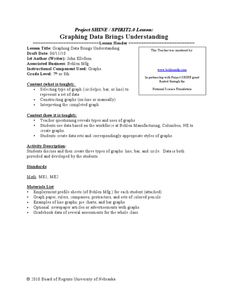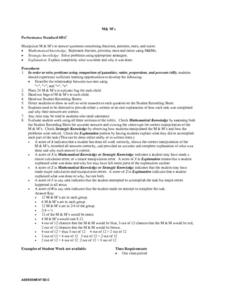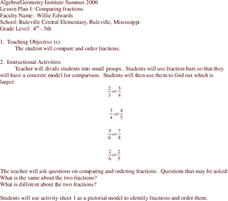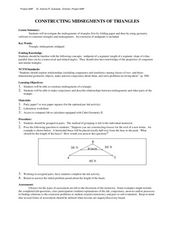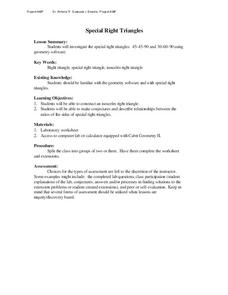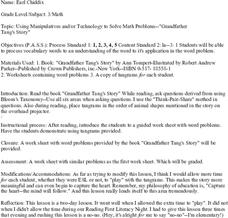Teach Engineering
Tell Me Doc—Will I Get Cancer?
Can you beat the odds of cancer? In the first installment of a seven-part series, future biomedical engineers consider how to detect and diagnose cancer. An article on biosensors provides useful information toward this goal.
Science 4 Inquiry
The Ups and Downs of Populations
As the reality of population decline across many species becomes real, pupils learn about the variables related to changes in populations. They complete a simulation of population changes and graph the results, then discuss limiting...
Teach Engineering
Airplane Tails and Wings: Are You in Control?
Keep everything under control. The lesson, the 16th segment in a 22-part unit, provides a more detailed look at the parts of a plane, specifically the control surfaces. Pupils learn about the construction of the wings and the tails and...
Teach Engineering
It's Tiggerific!
Spring into elastic potential energy with a lesson that provides background information on determining the elastic potential energy of springs and other elastic materials. General energy equations emphasize the conservation of...
Kenan Fellows
The Little Stuff Can Make a Big Difference
Great things come in small packages! What better way to illustrate this point than a week-long look at nanotechnology? Earth science scholars explore water quality issues through lab activities, then research new innovations in nanotech...
Cornell University
Magnetic Mad Libs
Examine the science behind computer communication. After defining the properties of magnets, learners simulate how a computer hard drive works by sending each other binary codes using the magnets. They use these communications to...
Kenan Fellows
Isotopic Pennies
Many people confuse atomic mass and atomic numbers. The sixth of seven lessons in a unit requires scholars to find the weight of different groups of pennies. Then, they must solve how many of each type of penny exists in a closed system...
Curated OER
Graphing Data Brings Understanding
Students collect, graph and analyze data. In this statistics lesson, students use circle, pie, bar and lines to represent data. They analyze the data and make predictions bases on the scatter plots created.
Curated OER
M&M's
Students use M&M candies to show fractions, percents, and ratios. Individually, they complete a worksheet using their candies and solving equations of greater than or less than. They review their answers and strategies used as a...
Curated OER
Exploring Multiplication and Division at a Party
Learners solve multiplication and division problems using Unifix cubes. They explore multiplication and division through equal grouping of objects and sharing. Students discuss the task they completed and share how they completed the...
Curated OER
Comparing Fractions
Students investigate concepts of working with fractions. They compare different fractions and put them in chronological order. The quantities are compared as either being larger or smaller also.
Curated OER
Constructing Midsegments of Triangles
Pupils construct midsegments. In this geometry instructional activity, students make conjectures and apply properties of triangles to solve problems. They complete an activity on the computer.
Curated OER
Heron's Formula
Students use Heron's formula to calculate the area of a triangle. In this geometry instructional activity, students use three different methods to solve the area of a triangle. They find and construct the incentor and angle bisector...
Curated OER
Special Right Triangles
Students identify different types of special right triangles. In this geometry lesson, students differentiate between right triangles and isosceles triangles. they construct the triangles using geometry software and make conjectures...
Curated OER
Careers Lesson: Budget Analysis
Ninth graders examine money management. They study percentages, inequalities, fixed and variable expense calculations in order to develop an understanding of how these concepts apply to budgeting a lifestyle for a specific career.
Curated OER
Cool Tools to Solve Challenging Word Problems
Students solve math word problems. In this cool tools lesson, students are introduced to the K-N-W-S method. Students work in groups and complete a worksheet using this method of learning.
Curated OER
Space Circles
Fifth graders calculate the diameters and radius of planets as a book is read to them. In this diameter and radius lesson plan, 5th graders read the book Space Circles and calculate the measurements based on the information in this book.
Curated OER
Place Value for Whole Numbers
Fourth graders, in groups, explore place value for whole numbers. They explore how to use base-ten materials to make sense of place value in the tens and ones column. They also explore whole-number patterns by using base-ten materials.
Curated OER
No Bias Allowed
Students differentiate graphical representations looking for the bias. They use a systematic process in order to solve problems. Students explain how a problem is solved and the steps involved. Even deeper than this is giving the...
Curated OER
Box And Whiskers
Students investigate the concept of using box and whisker plots. They demonstrate how to use them to compute median, mode, and range. Students compare and contrast the complete and systematic processes use to solve problems. This is done...
Curated OER
Grandfather Tang
Third graders read Ann Tompert's book, Grandfather Tang's Story, and complete math word problems based on the story. In this word problems lesson plan, 3rd graders use tangrams in the word problems.
Curated OER
Inscribed Right Triangles
Students calculate the measurements of the inscribed angles of a triangle. In this geometry activity, students relate the hypotenuse of a right triangle and the diameter of a circle to each other. They calculate the diameter of a circle...
Curated OER
Inscribed Quadrilaterals and Parallelograms
Students differentiate between inscribed quadrilaterals and parallelograms. For this geometry lesson, students identify the shaped of the polygons when it is inscribed inside of a circle. They calculate the missing angles of the...
Curated OER
World Population Study
Learners explore an exponential relationship and how it relates to human population growth and the current global population crisis. They graph both exponential and linear information.







